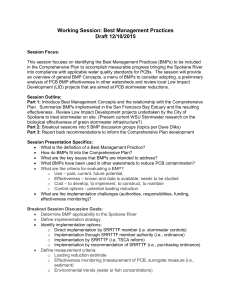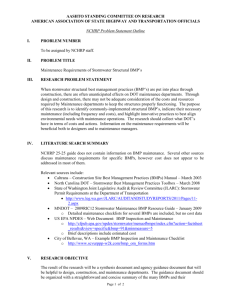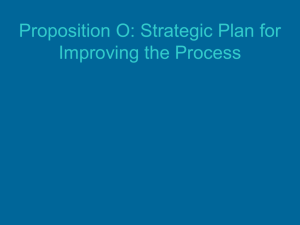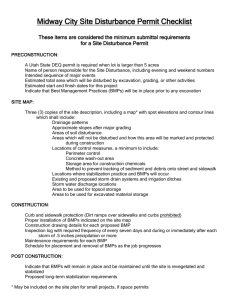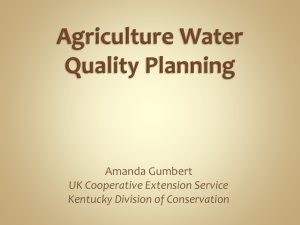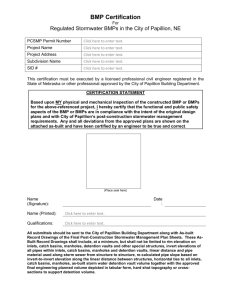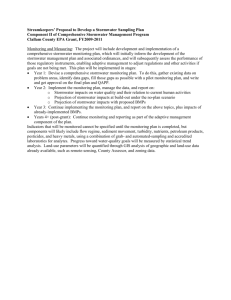BMP Focus Group Draft Notes 11-10-15
advertisement
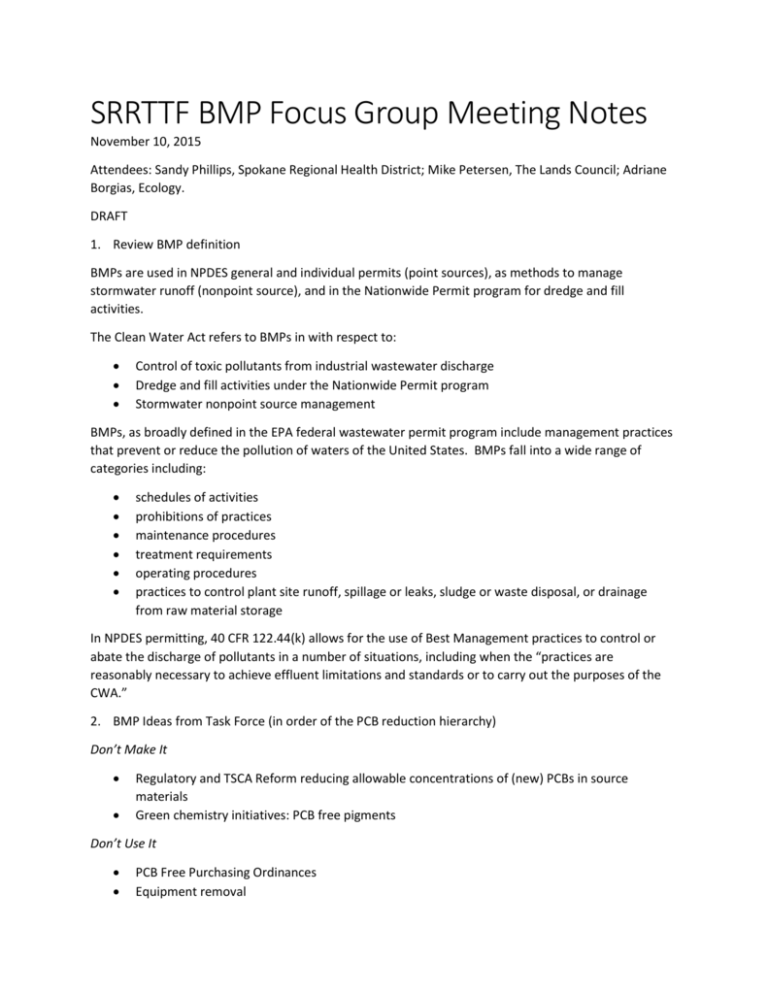
SRRTTF BMP Focus Group Meeting Notes November 10, 2015 Attendees: Sandy Phillips, Spokane Regional Health District; Mike Petersen, The Lands Council; Adriane Borgias, Ecology. DRAFT 1. Review BMP definition BMPs are used in NPDES general and individual permits (point sources), as methods to manage stormwater runoff (nonpoint source), and in the Nationwide Permit program for dredge and fill activities. The Clean Water Act refers to BMPs in with respect to: Control of toxic pollutants from industrial wastewater discharge Dredge and fill activities under the Nationwide Permit program Stormwater nonpoint source management BMPs, as broadly defined in the EPA federal wastewater permit program include management practices that prevent or reduce the pollution of waters of the United States. BMPs fall into a wide range of categories including: schedules of activities prohibitions of practices maintenance procedures treatment requirements operating procedures practices to control plant site runoff, spillage or leaks, sludge or waste disposal, or drainage from raw material storage In NPDES permitting, 40 CFR 122.44(k) allows for the use of Best Management practices to control or abate the discharge of pollutants in a number of situations, including when the “practices are reasonably necessary to achieve effluent limitations and standards or to carry out the purposes of the CWA.” 2. BMP Ideas from Task Force (in order of the PCB reduction hierarchy) Don’t Make It Regulatory and TSCA Reform reducing allowable concentrations of (new) PCBs in source materials Green chemistry initiatives: PCB free pigments Don’t Use It PCB Free Purchasing Ordinances Equipment removal o o Transformers/capacitors Light ballast Use Less of It Road Oil Hydroseed additives Deicer Purchasing standards/product testing Manage It Properly Fix Leaks Campaign for vehicles Clean up oil spills/protect waterways Local Source Control: good housekeeping Business incentive programs (Envirostars) Low Impact Development standards for stormwater management Example San Francisco Bay: Low Impact Development and Green Roofs: http://www.waterboards.ca.gov/sanfranciscobay/water_issues/programs/stormwater/muni/mrp/9-0611/MRP_Amendment_9-6-11.pdf http://www.waterboards.ca.gov/sanfranciscobay/water_issues/programs/stormwater/muni/mrp/0502-2011/Green_Roof.pdf Example San Francisco Bay: bioretention standards: http://www.waterboards.ca.gov/sanfranciscobay/water_issues/programs/stormwater/muni/mrp/122010/MRP_bioretention.shtml Other related BMPs o NPDES and Toxics Management Plan BMPs Example San Francisco Bay PCB TMDL and NPDES permit requirements: http://www.waterboards.ca.gov/sanfranciscobay/water_issues/programs/stormwater/mrp.shtml identify and manage controllable sources of PCBs use best management practices to maintain optimum performance for solids removal use updated analytical methods to test for PCBs undertake a program to reduce the health risks for people who eat San Francisco Bay fish contaminated with PCBs and mercury o Stormwater management BMPs Example San Francisco Bay Sediment identification and removal: http://www.waterboards.ca.gov/sanfranciscobay/water_issues/programs/stormwater/muni/mrp/2010 _AR/BASMAA/appendices/BASMAA_A2_2009-10_MRP_AR.pdf Example BMP for highway runoff: Boston, MA: Best Management Practices for highway runoff: http://pubs.usgs.gov/wri/wri024059/ o o Local Source Control BMPs for small business Local Source Control: Industrial stormwater at railyards, recyclers, autocrushers Example BMPs for management of industrial stormwater from Delware: http://www.dnrec.delaware.gov/wr/Information/SWDInfo/Documents/Min%20Required%20BMPs.pdf Example BMPs for recycled oil: Prevention of PCB in used oil: https://c.ymcdn.com/sites/noranews.siteym.com/resource/resmgr/TSCA_Reform_Effort/BMP_PCBdoc.pdf Education (all BMPs) Dispose of It Properly Demolition standards for PCB containing construction materials (local ordinances) Example program from San Francisco Bay for management of PCBs during demolition: http://www.sfestuary.org/wp-content/uploads/2013/01/4_FinalBMPsNov142011.pdf http://archive.epa.gov/region9/science/web/pdf/honore_pcb-caulk-training.pdf http://www.sfestuary.org/taking-action-for-clean-water-pcbs-in-caulk-project/ End of Pipe Treatment Bioretention/biotreatment Membrane technology 3. BMPs used by others The San Francisco Bay Estuary Institute has a PCB BMP Toolbox. This is a good place to start with respect to identifying and developing relevant BMPs. San Francisco Bay PCB BMP Toolbox: http://www.sfei.org/sites/default/files/biblio_files/A_BMP_toolbox__FINAL_04-04-10.pdf Evaluation of PCB BMPs in San Francisco Bay: http://www2.bren.ucsb.edu/~keller/courses/GP_reports/PCBSFbay_final.pdf Example San Francisco Bay Trash load reduction: http://www.waterboards.ca.gov/sanfranciscobay/water_issues/programs/stormwater/muni/mrp/022011/Trash_Baseline_Loads_2-1-11.pdf From the Ecology PCB Chemical Action Plan: Continue existing programs o Cleanup o Permitting o Stormwater management o Fish Advisories New actions to reduce PCBs: o Identify PCB-containing lamp ballasts in schools and other public buildings. o Encourage replacement with more energy-efficient PCB-free fixtures. o Develop and promote best management practices to contain PCBs in building materials, both in structures currently in use and those slated for remodel or demolition. o Assess schools and other public buildings for the presence of PCB-containing building materials. o Learn more about what products contain PCBs and promote the use of processes that don't inadvertently generate PCBs. Start with an alternatives assessment for pigments and dyes. o Expand environmental monitoring to identify new areas requiring cleanup and investigate air deposition. o Conduct a public education campaign. o Conduct a study on PCBs in Washington residents to prioritize future actions. 4. Recommendations for proposed path forward Identify issue (source, regulatory program, responsibility) Define the BMP Evaluate the BMP (use, effectiveness, cost, control options, potential loading reduction) Define implementation strategy Define measurement criteria 5. Parking Lot: for future discussion Implementation i. By Task Force Member organizations ii. Outreach to watershed
